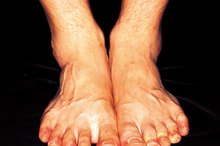Water Pills That Don't Adversely Affect the Kidneys
Also known as diuretics, water pills are medications that encourage fluid loss in the body. They are frequently prescribed when your body is not properly regulating its own fluids, such as when you have high blood pressure, body swelling or glaucoma. Each of three chief types of diuretic acts on a different part of the kidneys to remove water from your body. To avoid adversely affecting the kidneys, you must use the right diuretic type and refrain from abusing the limitations of a water pill.
Potassium-Affecting Diuretics
Your body needs potassium to perform a number of functions, but diuretics can affect the level of potassium in your body. Thiazide diuretics -- the most commonly prescribed diuretic -- stop the transport of salt to the distal tubule in the kidneys, thus promoting the loss of water and salts via increased urination, according to the Cardiovascular Pharmacology Concepts webpage. These diuretics are less powerful than loop diuretics, which affect the thicker ascending limb of the kidneys. Loop diuretics also stimulate the kidneys to synthesize hormones that cause your blood vessels to expand. When used properly, however, neither medication should adversely affect your kidneys.
- Your body needs potassium to perform a number of functions, but diuretics can affect the level of potassium in your body.
- These diuretics are less powerful than loop diuretics, which affect the thicker ascending limb of the kidneys.
Potassium-Sparing Diuretics
Diuretics & Blood Sugar Levels
Learn More
The final diuretic type prescribed is the potassium-sparing diuretic. If you have experienced adverse symptoms from loss of potassium -- such as rapid heartbeat and fatigue -- your physician may recommend this diuretic type. This medication acts on aldosterone, a hormone in the kidneys that can signal the release of water and salts. While these diuretics spare potassium loss, they often have mild results. Your physician may recommend using this diuretic with a lower-dose loop or thiazide diuretic for effectiveness. Providing you take these diuretic types as directed, you should not experience adverse symptoms related to the kidneys.
- The final diuretic type prescribed is the potassium-sparing diuretic.
- Your physician may recommend using this diuretic with a lower-dose loop or thiazide diuretic for effectiveness.
Drug Interactions
When taken properly, most diuretics will not affect your kidney function. Your kidneys may be affected, however, if you take diuretics and another medication known to cause harmful drug interaction symptoms. For example, you should not take a diuretic with digitalis, certain antidepressants, some high blood pressure medications, lithium or cyclosporine, notes the Texas Heart Institute. Always tell your doctor all the medications you are taking to avoid interactions that can affect the kidneys.
- When taken properly, most diuretics will not affect your kidney function.
- Your kidneys may be affected, however, if you take diuretics and another medication known to cause harmful drug interaction symptoms.
Side Effects
Name Different Kinds of Fluid Pills
Learn More
Patients have abused diuretics over the years as a means to encourage weight loss or in efforts to get faster results for painful swelling. Any water pill can adversely affect the kidneys when it is taken in excess or when you don’t drink enough water along with taking the pill. If you are taking water pills and experience side effects such as dizziness and light-headedness, these can be signs your body does not have water. Drink more water to prevent this from harming your kidneys. If your symptoms continue, you should speak to your physician about your medication.
- Patients have abused diuretics over the years as a means to encourage weight loss or in efforts to get faster results for painful swelling.
- Any water pill can adversely affect the kidneys when it is taken in excess or when you don’t drink enough water along with taking the pill.
Related Articles
References
- Bupa UK: Diuretics
- Cardiovascular Pharmacology; Diuretics; Richard E. Klabunde, PhD
- ABC News; What Are the Side Effects of Diuretics, and Can Diuretics Hurt My Kidneys?; Dr. Ray Hershberger; November 2008
- Duarte JD, Cooper-DeHoff RM. Mechanisms for blood pressure lowering and metabolic effects of thiazide and thiazide-like diuretics. Expert Rev Cardiovasc Ther. 2010;8(6):793–802. doi:10.1586/erc.10.27
- U.S. National Library of Medicine, StatPearls. Thiazide Diuretics. Updated February 4, 2019.
- U.S. National Library of Medicine, StatPearls. Loop Diuretics. Updated October 15, 2019.
- Elsevier ScienceDirect. Hypokalemia: Adjuncts to Therapy. Published 2017.
- American Heart Association. Types of Blood Pressure Medications. Reviewed October 31, 2017.
- National Health Service, UK. Furosemide. Reviewed January 10, 2019.
- Johns Hopkins Lupus Center. Blood Pressure Medications (Anti-hypertensives).
- Leone A. Does Smoking Act as a Friend or Enemy of Blood Pressure? Let Release Pandora's Box. Cardiol Res Pract. 2011;2011:264894. Published 2011 Jan 19. doi:10.4061/2011/264894
- Harvard Health Publishing, Harvard Medical School. Tips for Taking Diuretic Medications. Updated September 25, 2019.
- American Heart Association. Changes You Can Make to Manage High Blood Pressure. Reviewed November 30, 2017.
Writer Bio
Rachel Nall began writing in 2003. She is a former managing editor for custom health publications, including physician journals. She has written for The Associated Press and "Jezebel," "Charleston," "Chatter" and "Reach" magazines. Nall is currently pursuing her Bachelor of Science in Nursing at the University of Tennessee.








